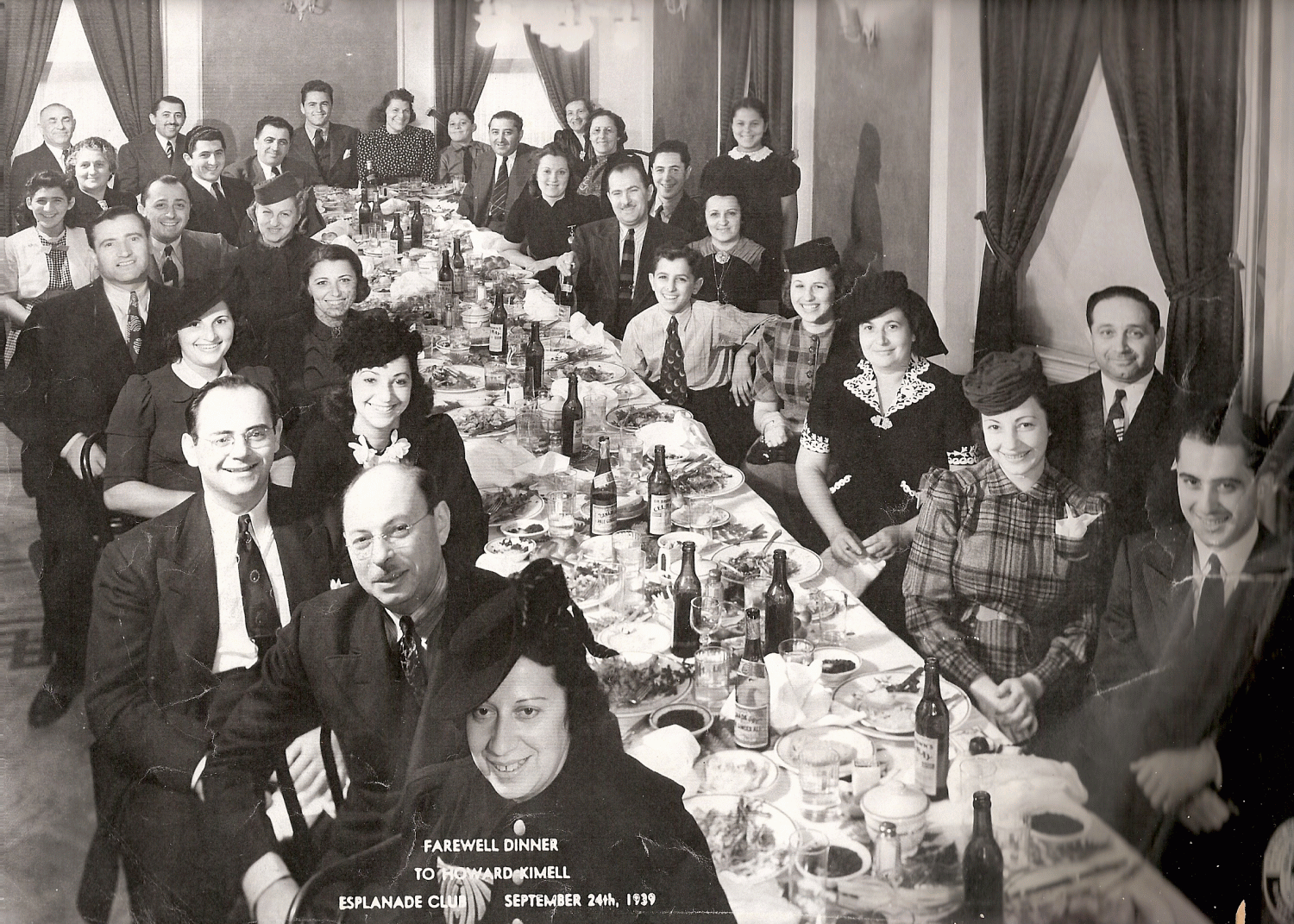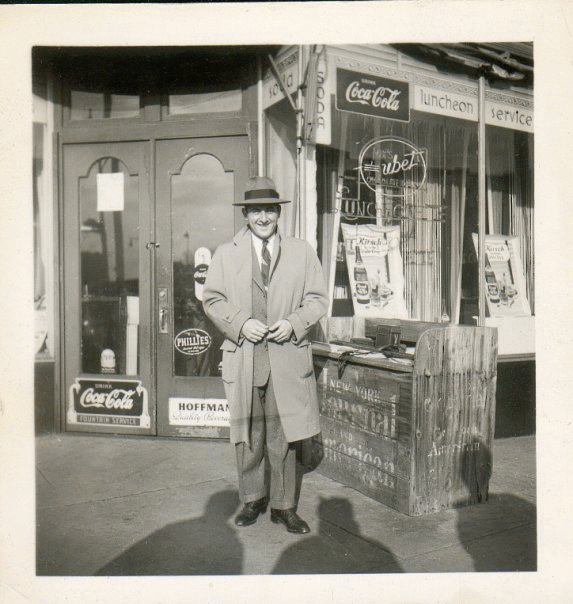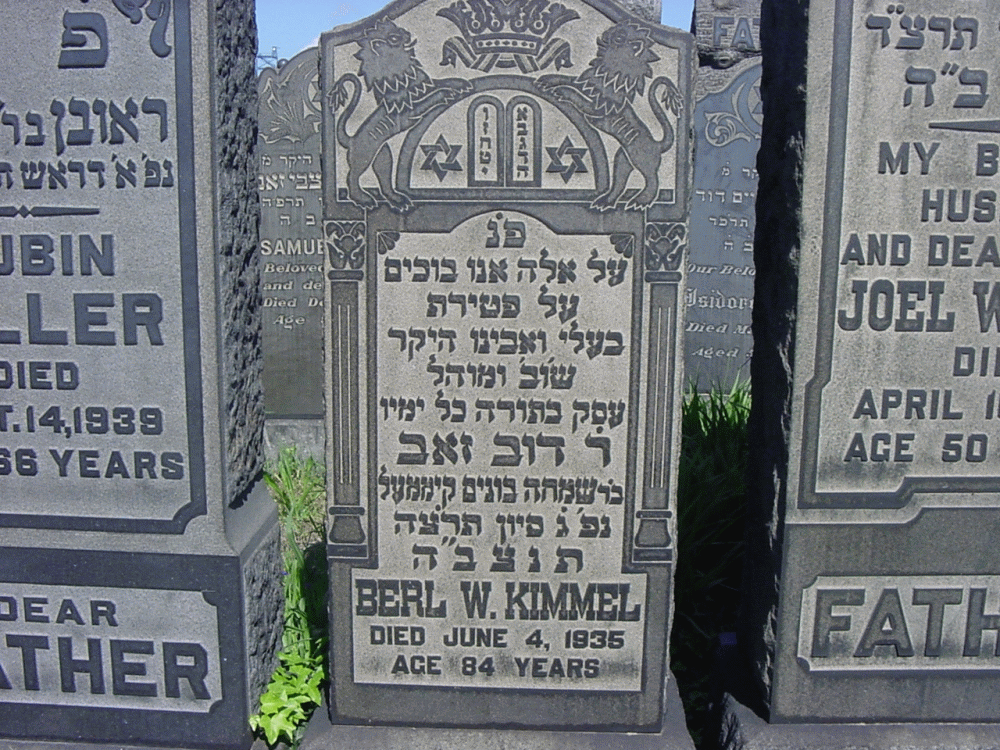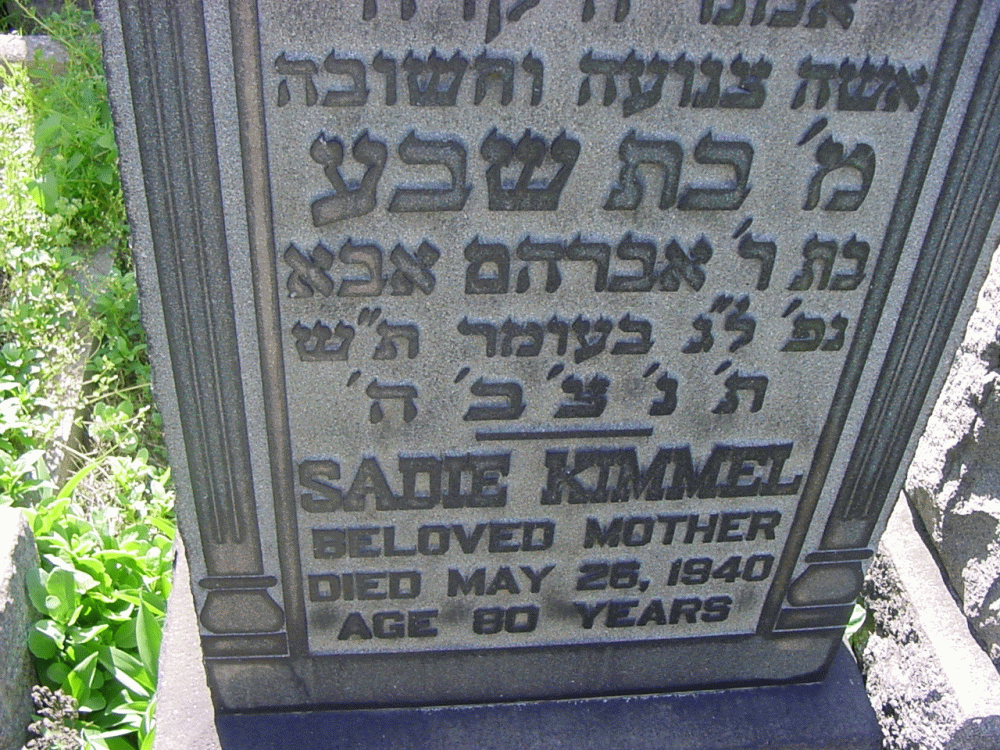
During my research of the Kimmels, my mother's side of the family, I came into contact with fellow JewishGen researcher Dov Rubin who told me of the discovery he had made in his own investigations: that his great grandfather was the brother of my great grandfather, who came from Kovel. The surprise was that both lines of the brothers' descendants lived in Brooklyn, N.Y., a haven for Jewish immigrants - but neither side appeared to be aware of the other by the time I was born. In 2013, Dov found evidence of a third brother.
Dov shared that surprise when we first corresponded in 2006. "I find this fascinating in that my grandmother, who was a Kimmel, never told me anything about this other side of the Kimmel family," he wrote. "I discovered an old blurry photo and began piecing things together over the years. I had never met anyone from this side of the Kimmel family and assumed they had all perished."
My father, who married Arlene Kimmel in 1948, also knew nothing of the other Kimmels.
Both lines of Kimmels started with Simcha Benjamin (Bunim) Kimmel. He was born sometime before 1829 in Russia (and died around 1900) and had two sons, Itzhak David Kimmel and Beryl Wolf. Both immigrated to New York, Itzhak David in 1901 when he was 36 while brother Beryl Wolf, about 54, followed in May, 1906 aboard the S.S. Vaderland from Antwerp. Here is a descendant tree for my line of the family. Here is the descendant tree put together by Dov which contains all the Kimmels and Rubins.
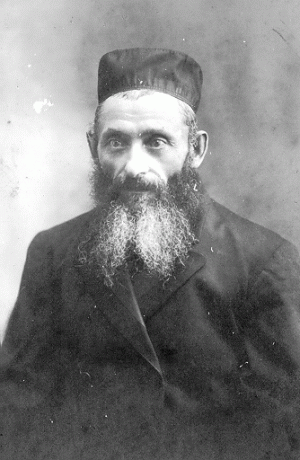
Beryl Wolf's wife Shaiva was the daughter of Kishinev's Chief Rabbi (I believe his name was Avraham Abba Burkan) and that she got married at 12 to Beryl, who was the Rabbi's "star pupil." A Kimmel descendant told Dov Rubin that Beryl...
"… became trained as an excellent mohel and shochet (a man in the Jewish community who is authorized to kill animals according to Kosher law) and would travel all around the Black Sea. He would put my father Barnett (this was Beryl's Barnett, not the Barnett that was David's son and married our grandmother), on a horse and wagon and take him all over. My father used to meet all sorts of people at the inns they would stop over in. Beryl Wolf would eat heartily while my father was forced to watch and eat nothing. My father couldn't forgive that. In the 1880s, a Goldwasser from Denver contacted my grandfather Beryl Wolf to come to Denver. My grandmother had a very hard life in that Beryl Wolf left her for those 8 years. During that time he forced her to stay at a remote 'inn' deep in a Moldavian forest where she had to fend for herself and earn a livelihood for the children. He did return with some money but only after he felt it was too dangerous with the Indians starting to shoot all over the Wild West. I would say that overall, he was a very insensitive person and wouldn't show his emotions outwardly. He was arrested by the Brooklyn police 2 times on bootlegging during the prohibition. The first time, he got off because one of the Rosen children was a DA. The second time, the police followed him from his large purchases of prunes and sugar to selling liquor. Also, the vat he used once exploded exposing him to an investigation. I understand that one day he was walking to shul and slipped on the ice and broke his hip. Six weeks later he died."
But Dov says Beryl was far from a criminal. "In those days of prohibition, many religious people were forced to make their own wine for Friday night Kiddush. He was actually rather a meek guy and had no influence whatsoever on his delinquent grandson Samuel, (about whom, more later)," according to Dov.
Another descendant remembers him as a smoker, and also remembers him "drinking tea through a sugar cube in the kitchen."
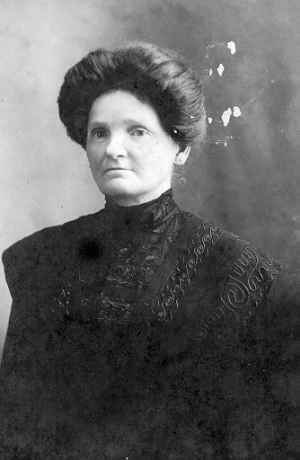
It is no surprise that Beryl and his family left Kishinev in 1906. There had been two devastating pogroms. The first occurred on Easter day, 1903 when mobs - believing Jews had murdered a Russian Catholic boy -- killed 49 Jews, severely wounded 92, injured 500 others, and looted and destroyed 700 homes, according to one report, although other reports vary in the specifics. The violence was stirred by anti-Semitic newspapers that Jews murdered the boy - who was actually killed by a relative - so they could use the blood in the preparation of matzoh.
Arriving in New York with him was his wife Shaiva; Baruch, 21; Reisel, 20; Ettel, 17; Moses, 11; and Genia, 3 years and 6 months. Beryl told immigration authorities he would be staying with David who lived at 63 Jefferson St., near East Broadway a couple of blocks north of the Manhattan Bridge and about two blocks from the East River. Beryl listed himself as a laborer.
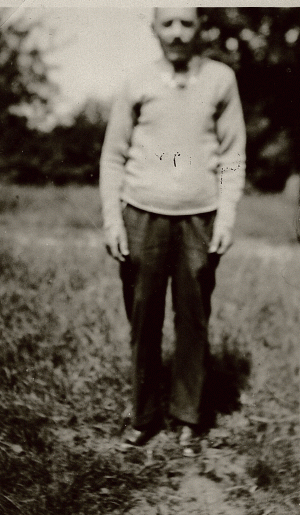
David Kimmel was born in 1865 in Russia. He arrived in New York 1901 and was followed by his wife, Goldie Turkenitch in 1904, bringing along five children, including my grandfather, Barnett. The Turkenitzes also came from Kovel.
Goldie was 35 when she arrived aboard the SS Staatendam to join David who was then living at 44 Rutgers St. in Flatbush. My grandfather Barnett was 9 at the time, and the brothers and sisters arriving with him were Leib, age 11 (b. 1893), Sosche, age 6 (b. 1898), Israel age 5 (b. 1898) and Simche age 2 (b. 1902). Simche (Sam) seems to have called her "Gussie."
David Kimmel listed his occupation as a truckman at a clothing factory in the 1920 census and as a "shoe polisher" in the 1930 Census, by which time the family was living at 1083 Eastern Parkway, near Utica Ave., just north of East Flatbush. Living right nearby, in 1920, just a few entries down on the census sheet, was Goldie's sister Eva, who had married Max (Munish) Stern, a dealer in dry goods. A descendant of Eva's believes that Goldie was responsible for bringing her and her husband to the U.S.
A daughter of Goldie's sister Eva said "Golda and David's marriage was a love match, not an arranged marriage that was the usual custom of the day."
Frederick Kimmel, a grandson of David's, remembers only that when they went to David's house he was always smoking Camels or a similar cigarette that he kept in a tin can. Frederick's brother Howard said, "I heard that David deserted the Czars Army to make his way to the USA, that he was a drummer in said army....all very romantic but difficult to believe." Both Frederick and Howard have passed away, Frederick this year and Howard in 2008.
Whether David actually served in the army or not was questionable. In 1886 there was established a fine in the amount of 300 rubles charged a family of a recruit who hasn't appeared for draft.In most of cases it wasn't paid and just kept to be a debt." Tax records for Kovel listed David as being 300 rubles in arrears.
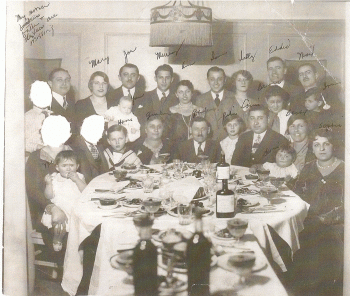
Howard also recalled, "being dragged to what the Kimmel's considered a specialty of Golda's... 'heita'......I think the Yiddish name was......cows udders...need I say more? She was also renowned for "cholent"..a combination of meat, potatoes,carrots etc. put in an oven lighted on Friday before sundown and left on low until sundown on the end of the Sabbath....to me it tasted like seasoned glue."
One of David's sons, Barnett, my grandfather, married Rachel (Rae) Zlotnick in 1917. Rae was the daughter of Jacob and Lena Zlotnick (neé Adelman or Eidelman) who immigrated to New York in 1888. He appears to have come from Bialystock in Grodno, according to the Hamburg manifests.

Jacob was a saloonkeeper who had a bar on Henry Street on the Lower East Side, although the family had moved to 656 Flushing Ave. by at last 1915. His oldest son, Harry, appears to have opened another bar in Brooklyn, because a Nov. 23, 1915 story in the Brooklyn Daily Eagle - under the headline "What Sharp Eyes Our Sleuths Have!" - reported he was caught by police for permitting a card game to go on in the rear of his establishment.
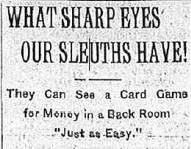
"As I live and breathe," said Detective Cody, according to the Eagle's account of this masterful police work, "there is someone there playing cards.""Playing with playing cards," echoed Detective Freel.
"Thus violating the law of our fair precinct," chimed in Detective Dolan.
Lena died Feb. 14, 1913. She had been treated for diabetes for two years and she lapsed into a diabetic coma. The Hebrew inscription on her tombstone read: "On this I am crying/My eyes are shedding tears/On the death of my beloved mother/Leah, daughter of R' Yakov." Jacob died December 13, 1918, at 53. His occupation by this time was listed as "liquor dealer." The death certificate says his parents were Harry Zlotnick and Rose (neé Monta), from Russia.

David Kimmel died on January 14, 1936. My grandfather Barnett signed the death certificate. His gravestone at Mount Lebanon reads: "David Kimmel; Yitzchak David ben R' Simcha Bunim; d. Jan. 14, 1936; age 71 [b. 1865]"
Goldie died three years after David. She had been suffering from arteriosclerosis for 15 years and entered Beth El Hospital in Brooklyn. Son Louis signed the death certificate, and her parents were listed as Israel and Ann (neé Lapidus). The gravestone at Mount Lebanon cemetery reads: "Golda bat R' Yisrael; d. Feb. 12, 1939; beloved mother."
Beryl Wolf Kimmel died June 4, 1935 in Brooklyn. He was buried in in the Kovler Voleener Society of Mt. Zion cemetery in Maspeth, NY. His gravestone read: "Reb Dov Zev ben R' Simcha Bunim Kimmel. On this I cry, on the death of my husband and our father the teacher and mohel who learned torah his whole life. d. June 4, 1935 aged 84 years (b.1851)" Sadie followed him on May 26, 1940, also in Brooklyn. She also was buried in the Kovler section of Mt. Zion.

"Your grandfather, Barney was ...to me...a great guy...always with a smile and a kind word..I used to call him 'Champ'...I think it may have been because we rooted for the same teams (mainly the NY Giants) ...unfortunately he didn't enjoy good health and evidently had rotten luck," said Howard Kimmel, son of Barnett's brother Joe.
Most of the sons of David Kimmel had gone into some area of the garment business and Rae took advantage of connections in Manhattan's garment district to lay her hands on high-quality women's clothing which she sold out of her apartment in the Middleburg section of Brooklyn. She was succesful enough to help both of her children buy their first houses, and put their four children through college. When she was the glue that held all the Kimmel descendants together and when she died in 1978, the relatives on my side of the family grew apart.
My mother Arlene married Stanley Drach in 1948. He and his brothers changed their names to Drake when they opened an appliance business together between Manhattan's financial district and City Hall. I also have created a shtetlinks site for the town from which his father came, Wojnilow, part of Galicia, which is now known as Voynilov in the Ukraine.
Stanley passed away in 2012 and Arlene died in 2005. Her brother Lester, like his father Barnett, died young of a heart attack in 1975 when he was 56.
As for Dov Rubin's line of Kimmels growing out of touch with mine, he said "it doesn't strike me as odd" that the two sides of the family grew unaware of each other. "My grandfather told me many times when I was grilling him about family, that everyone was busy and never had time for socializing," he said. "Sounds strange by our standards. Also, no one on my side of Kimmels ever heard of your side. I was the one who found the linkage." My own father observed how different things were in those years, whether it came to communication or getting around.
There, though, at least one instance where our side of the Kimmels heard about the other branch.
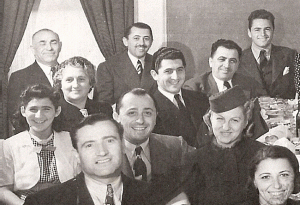
Prior to the reprieve, the case of Samuel Kimmel and his accomplices had stirred a debate over the death penalty, particularly for those under the age of 21. At the time, there were 10 youths under 21 in Sing Sing and the President of the Association of Local School Boards in Manhattan had presented a petition to the Governor asking abolition of the death penalty for those under that age. Lehman had said in answer to the petition, "Frankly, I can see no difference in the guilt of a man of 20 years and a man of 22 years. I think it would be a very great step backward if we did away with capital punishment for those under 21."
The New York Post explained the governor's change of heart by saying he "apparently took into consideration the plea that these youths did not know a murder had been planned when they set out to rob 22 year old Edwin Esposito. . ."
The Post went on: "Abraham Kimmel, patriarchal father of a transgressor son, was at that moment praying in a Brownsville synagogue, shrouded in his "talith" and wearing his phylacteries on his pale brown and worn, thin arm. He arose when he was told and put away the talith and phylacteries in a velvet blue bag on which was embroidered a gold six-pointed star of David. "I will not have to say Kaddish for my boy", he said. Kaddish is the Hebrew prayer for the dead. . ."
The third Kimmel brother, Notta, did not come to the U.S. Notta was born sometime before 1866 and died sometime before 1915.
He had a son, Mordechai, who was born in Kovel in 1886 and came to New York on the SS Noordam in 1908, saying he would be staying with his uncle, Beryl Wolf. Mordechai had been an apothecary in Kovel and he continued his occupation as a druggist in New York, where he had a pharmacy in Brooklyn. He married Leah Liefschitz, and they had two children, Jess and Dorothy.
Jess Kimmel went on to a succesful career in Hollywood. According to the Online Archives of California, he made "the transition from work in the movie industry to television and was under contract to ABC, CBS, and NBC. His credits included The Bob Hope Show, Colgate Comedy Hour, The Red Buttons Show, and Your Show of Shows, among others. During his career, he also worked on a number of stage productions including The Alchemist, Cyrano de Bergerac, The Merry Widow Revue and The Shrike. He died May, 1961 in New York."
Other Kimmels
The 1951 edition of the Pinkes Kovel lists several Kimmels from Kovel in its memorial pages. I have not been able to determine what their relationship is, if any, to my own ancestors who came to America so many years earlier. The names of these Kimmels are Nata, Chaya, Faiga, Hasiya, Menachem Mendel, Mordechai Menachem and Yitzhak Tzvi. Yitzhak Tzi was married to a Tova Sheindel.
However, a visitor to this site, whose Kovel ancestors originally immigrated to Argentina, did recognize several of the names in this list.
Isidoro (Yitzhak Tvi) Kimel writes:
You made reference to very close relatives of mine. Mordechai Menachem was my father, Yitzhak Tzvi was my grandfather who was deceased when I was born and after whom I'm named. Tova Sheindel was my grandmother and my sister is named after her. Menachem Mendel Kadish was married to my aunt Braha.My father was born in 1907 and came to Argentina when he was 18. In Spanish we don't double letters except for "l", so the name was spelled "Kimel". When my father was born there must have been about 15 thousand Jews in Kovel (or Kowel). Since it is not an extremely common name, we have to assume all Kimmels in Kovel were related.
Kimmel Family Photos
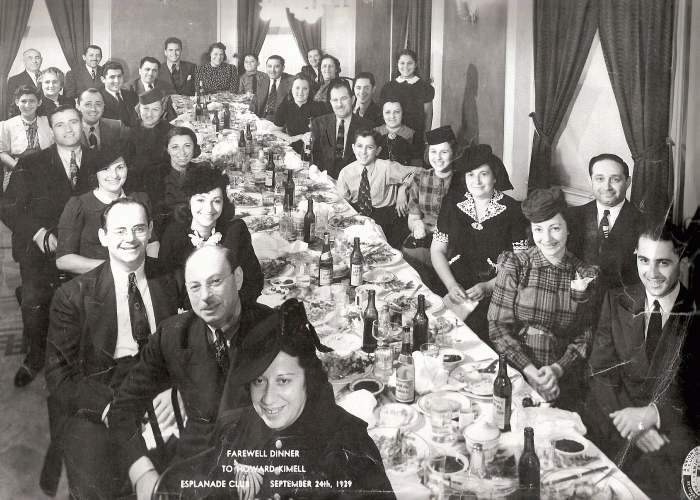
Click on the photos below for larger versions
Copyright © 2009 Bruce Drake
